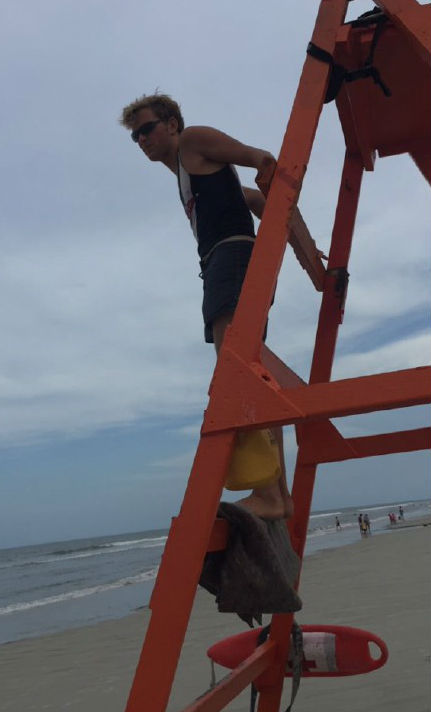The Secret Life of Life Guards
March 1, 2016
As Spring Break quickly approaches, Floridians anxiously await a rise in temperatures, so they can once again enjoy the surf and sun. The beaches are one of our state’s main attractions, but they wouldn’t be as successful without the careful watch of those employed to govern the shores: lifeguards. Most beach goers hope to have minimal contact with the lifeguards on duty, and never see all that goes on behind the scenes to prepare lifeguards for the important role they play in maintaining a fun and safe beach environment.
Lifeguards do not just waltz onto the beach and plop down into a tall red chair to get the job. There is an extensive amount of training that happens before a potential lifeguard even hits the sand. At Jacksonville Beach, lifeguards are sponsored by the American Red Cross Volunteer Life Saving Corps (ARCVLSC).
“You have to go through about a 12 week recruit class in order to join ARCVLSC,” says Alex Pippins (’16) who began lifeguarding during the summer 2014 recruit class. “The class teaches the medical info needed to lifeguard but is also a very physically challenging course to complete.”
The recruitment class, Pippins adds, provides all who pass with an EMR and CPR certification, which has to be recertified every year. There is also an annual physical test, including a 550 meter and mile timed swim.
American Red Cross Volunteer Life Saving Corps lifeguards not only hold normal positions paid by the city of Jacksonville Beach, but they also volunteer their time on Sundays and major holidays to maintain beach safety on some of the most crowded days.
Some smaller coastal communities around the country even hire private lifeguards to work on their strip of beach, further emphasizing the necessity of lifeguards.
Another relatively unknown aspect of lifeguarding is that it is considered a sport. The activity itself is formally referred to as “lifesaving sport.” Every year, thousands of life savers compete in a variety of different events, including Bolles’s own French teacher, Mr. Humberston.
His passion for lifeguarding began during high school in Pennsylvania, when his swim coach offered him a job on the Jersey Shore.
“I got to live at the beach for the summer. I couldn’t say no,” says Humberston. “I wouldn’t say anything inspired me to be a lifeguard, it was just a really great opportunity.”
As far as competing, he says it “comes with the job.” There are competitions to receive a spot on a squad, competitions within squads, between different squads and they continue to expand to the international level.
“I get to meet lots of cool people and I get to travel to amazing places…like Australia and New Zealand,” says Humberston. “Plus you can’t get bored; there are so many different competitions. It definitely keeps you busy.”
Mr. Humberston competes in the ironman event (not to be confused with the triathlon.) The lifesaving sport ironman includes swimming, board paddling, ski paddling, running and believe it or not it is all done in a single event.
To stay in shape during the teaching year, Mr. Humberston goes to the Episcopal pool to swim, paddleboard and surfs “when the waves are good.” And, true to the namesake of the sport, there are events dedicated to actual rescues.
“Even the victims in the rescues have to be in shape,” laughs Humberston. “They start at the beach and then have to race all the way to the buoy to wait to be rescued.”
So whether looking for a summer job or a new athletic challenge, lifeguarding is a dynamic option for anyone willing to handle the responsibility and rigor of saving lives.







